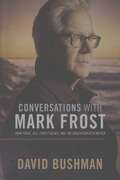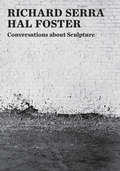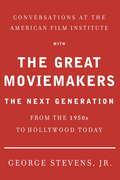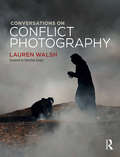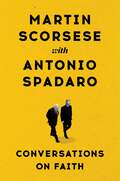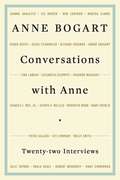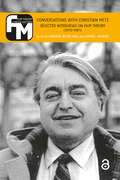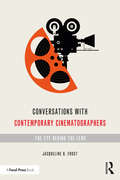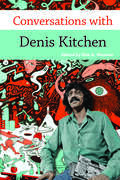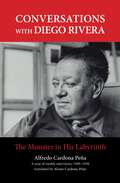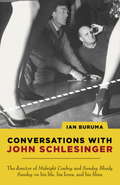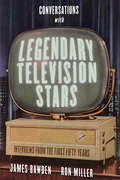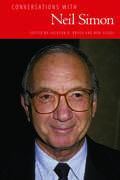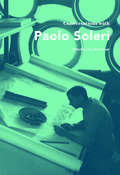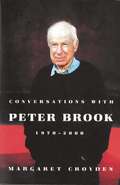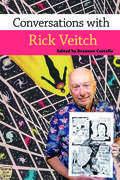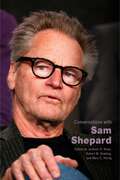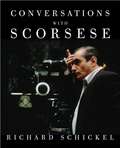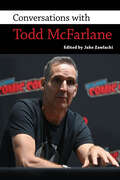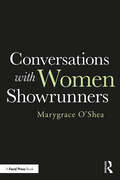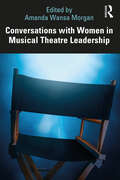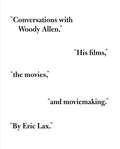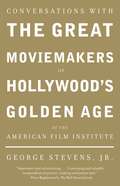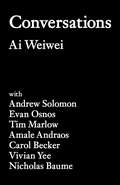- Table View
- List View
Conversations With Mark Frost: Twin Peaks, Hill Street Blues, and the Education of a Writer
by David BushmanTwin Peaks co-creator Mark Frost dishes about his long and storied career, including his time as a stagehand at Mister Rogers' Neighborhood ; his early days as a a young bachelor in Hollywood rooming with Adam Arkin and Michael O'Keefe; his brief time at Universal TV before chucking it all away to return home to Minnesota to work on documentaries; his experiences in the infamous Hill Street Blues writing room with Steven Bochco and David Milch; and, finally, his career-defining collaboration with David Lynch on Twin Peaks.Mark Frost, cocreator of both the original Twin Peaks and The Return, is often lost in the shadow of co-creator David Lynch in the eyes of critics and scholars -- one newspaper even called him the "Other Peak." In fact, Frost played at least as crucial a role in developing the narrative, mythology, and aesthetic of what has come to be revered as one of the most artful and influential shows ever to air on television. This book, comprising a series of interviews with Frost over the course of a single year, finally and fully acknowledges the extent of Frost's contributions not only to those series, but also to American television in general, as a writer/producer on Hill Street Blues and other shows, and as a mentor to numerous other writers. The book traces the arc of his entire life and career, from his boyhood days in New York, Los Angeles, and Minneapolis, to his nascent playwriting career in Pittsburgh, to his days as a writer at Universal TV's famed factory of the seventies, to his work on Hill Street Blues alongside such industry titans as Steven Bochco and David Milch, to his multiple collaborations with the famously enigmatic Lynch, who perhaps emerges as slightly less enigmatic in the pages of this book. Conversations with Mark Frost deconstructs that legendary partnership, while at the same time exploring Frost's values, influences, thematic preoccupations, and approach to creating art -- for the screen, the stage, and the printed page -- as well as his thoughts about such topics as politics, extraterrestrial life, ethics, and the future of the human race.
Conversations about Sculpture
by Hal Foster Richard Serra“The rhythm of the body moving through space has been the motivating source of most of my work.”—Richard Serra Drawn from talks between celebrated artist Richard Serra and acclaimed art historian Hal Foster held over a fifteen-year period, this volume offers revelations into Serra’s prolific six-decade career and the ideas that have informed his working practice. Conversations about Sculpture is both an intimate look at Serra’s life and work, with candid reflections on personal moments of discovery, and a provocative examination of sculptural form from antiquity to today. Serra and Foster explore such subjects as the artist’s work in steel mills as a young man; the impact of music, dance, and architecture on his art; the importance of materiality and site specificity to his aesthetic; the controversies and contradictions his work has faced; and his belief in sculpture as experience. They also discuss sources of inspiration—from Donatello and Brancusi to Japanese gardens and Machu Picchu—revealing a history of sculpture across time and culture through the eyes of one of the medium’s most brilliant figures. Introduced with an insightful preface by Foster, this probing dialogue is beautifully illustrated with duotone images that bring to life both Serra's work and his key commitments.
Conversations at the American Film Institute with the Great Moviemakers
by George Stevens Jr.A companion volume to George Stevens, Jr.'s, much admired book of American Film Institute seminars with the great pioneering moviemakers ("Invaluable"--Martin Scorsese).Those represented here--directors, producers, writers, actors, cameramen, composers, editors--are men and women working in pictures, beginning in 1950, when the studio system was collapsing and people could no longer depend on, or were bound by, the structure of studio life to make movies. Here also are those who began to work long after the studio days were over--Robert Altman, David Lynch, Steven Spielberg, among them--who talk about how they came to make movies on their own. Some--like Peter Bogdanovich, Nora Ephron, Sydney Pollack, François Truffaut--talk about how they were influenced by the iconic pictures of the great pioneer filmmakers. Others talk about how they set out to forge their own paths--John Sayles, Roger Corman, George Lucas, et al. In this series of conversations held at the American Film Institute, all aspects of their work are discussed. Here is Arthur Penn, who began in the early 1950s in New York with live TV, directing people like Kim Stanley and such live shows as Playhouse 90, and on Broadway, directing Two for the Seesaw and The Miracle Worker, before going on to Hollywood and directing Mickey One and Bonnie and Clyde, among other pictures, talking about working within the system. ("When we finished Bonnie and Clyde," says Penn, "the film was characterized rather elegantly by one of the leading Warner executives as a 'piece of shit' . . . It wasn't until the picture had an identity and a life of its own that the studio acknowledged it was a legitimate child of the Warner Bros. operation.") Here in conversation is Sidney Poitier, who grew up on an island without paved roads, stores, or telephones, and who was later taught English without a Caribbean accent by a Jewish waiter, talking about working as a janitor at the American Negro Theater in exchange for acting lessons and about Hollywood: It "never really had much of a conscience . . . This town never was infected by that kind of goodness." Here, too, is Meryl Streep, America's premier actress, who began her career in Julia in 1977, and thirty odd years later, at sixty, was staring in The Iron Lady, defying all the rules about "term limits" and a filmmaking climate tyrannized by the male adolescent demographic . . . Streep on making her first picture, and how Jane Fonda took her under her wing ("That little line on the floor," Fonda warned Streep, "don't look at it, that's where your toes are supposed to be. And that's how you'll be in the movie. If they're not there, you won't be in the movie"). Streep on the characters she chooses to play: "I like to defend characters that would otherwise be misconstrued or misunderstood." The Next Generation is a fascinating revelation of the art of making pictures.
Conversations on Conflict Photography
by Lauren WalshIn today’s image-saturated culture, the visual documentation of suffering around the world is more prevalent than ever. Yet instead of always deepening the knowledge or compassion of viewers, conflict photography can result in fatigue or even inspire apathy. Given this tension between the genre’s ostensible goals and its effects, what is the purpose behind taking and showing images of war and crisis? Conversations on Conflict Photography invites readers to think through these issues via conversations with award-winning photographers, as well as leading photo editors and key representatives of the major human rights and humanitarian organizations. Framed by critical-historical essays, these dialogues explore the complexities and ethical dilemmas of this line of work. The practitioners relate the struggles of their craft, from brushes with death on the frontlines to the battles for space, resources, and attention in our media-driven culture. Despite these obstacles, they remain true to a purpose, one that is palpable as they celebrate remarkable success stories: from changing the life of a single individual to raising broad awareness about human rights issues. Opening with an insightful foreword by the renowned Sebastian Junger and richly illustrated with challenging, painful, and sometimes beautiful images, Conversations offers a uniquely rounded examination of the value of conflict photography in today’s world.
Conversations on Faith
by Martin Scorsese Antonio SpadaroFrom the legendary film director Martin Scorsese, a book in which he and Father Antonio Spadaro discuss the visionary filmmaker's relationship to faith throughout his life. From his Italian-American upbringing as a Catholic in New York to the meditations on religion, belief, and the divine found in his filmography, Martin Scorsese's relationship to his faith has touched every aspect of his life and work. When Italian journalist Father Antonio Spadaro and Martin Scorsese first sat down together in Scorsese's home, neither could have predicted the depth of the conversation, intellectual exchange, or friendship that would result. While discussing the acclaimed director's film Silence, about the persecution of Jesuits in Japan, they began a dialogue about faith that continues to this day. In their often-profound conversations, he and Father Spadaro have left no stone unturned, discussing this relationship along with everything from Scorsese's childhood to the concept of the soul. And as a result of their long friendship and communication, Scorsese met with Pope Francis. Readers will gain new insight into one of the most famous directors of the twentieth and twenty-first centuries in these honest, moving, and ultimately inspiring Conversations on Faith.
Conversations with Anne
by Anne BogartFrom one remarkable mind to another, Conversations with Anne documents the series of intimate interviews that theater director Anne Bogart has conducted-before live audiences-with major artists and cultural thinkers at her West Side studio over half a decade. In these extraordinary conversations, Bogart and her guests consider such free-ranging topics as the driving forces in their work, the paths their lives have taken, and their visions for the future of their field. Bogart delves into the daily thoughts of these artists and thinkers whom she most admires-a group that, collectively, has profoundly shaped the arts and artistry in America over the past twenty-five years.Interviewees include: JoAnne Akalaitis, Lee Breuer, Ben Cameron, Martha Clarke, Oskar Eustis, Zelda Fichandler, Richard Foreman, Andre Gregory, Bill T. Jones, Tony Kushner, Tina Landau, Elizabeth LeCompte, Eduardo Machado, Charles Mee, Joseph V. Melillo, Meredith Monk, Peter Sellars, Molly Smith, Elizabeth Streb, Julie Taymor, and Paula Vogel.Anne Bogart is artistic director of the SITI Company, which she founded with Japanese director Tadashi Suzuki in 1992. She has received two OBIE Awards, a Bessie Award, and a Guggenheim Fellowship, and is a professor at Columbia University, where she runs the Graduate Directing Program.
Conversations with Christian Metz: Selected Interviews on Film Theory (1970-1991) (Film Theory in Media History)
by Warren Buckland Daniel FairfaxFrom 1968 to 1991 the acclaimed film theorist Christian Metz wrote several remarkable books on film theory: Essais sur la signifi cation au cinéma, tome1 et 2; Langage et cinéma; Le signifiant imaginaire; and L'Enonciation impersonnelle. These books set the agenda of academic film studies during its formative period. Metz's ideas were taken up, digested, refined,reinterpreted, criticized and sometimes dismissed, but rarely ignored., This volume collects and translates into English for the first time a series of interviews with Metz, who offers readable summaries,elaborations, and explanations of his sometimes complex and demanding theories of film. He speaks informally of the most fundamental concepts that constitute the heart of film theory as an academic discipline — concepts borrowed from linguistics, semiotics, rhetoric, narratology, and psychoanalysis., Within the colloquial language of the interview, we witness Metz's initial formation and development of his film theory. The interviewers act as curious readers who pose probing questions to Metz about his books, and seek clarification and elaboration of his key concepts. We also discover the contents of his unpublished manuscript on jokes, his relation to Roland Barthes, and the social networks operative in the French intellectual community during the 1970s and 1980s.
Conversations with Contemporary Cinematographers: The Eye Behind the Lens
by Jacqueline B FrostPacked with gems of wisdom from the current 'masters of light’, this collection of conversations with twenty leading contemporary cinematographers provides invaluable insight into the art and craft of cinematography. Jacqueline Frost’s interviews provide unprecedented insight into the role as cinematographers discuss selecting projects, the conceptual and creative thinking that goes into devising a visual strategy, working with the script, collaborating with leading directors such as Martin Scorcese, Spike Lee, and Ava DuVernay, the impact of changing technology, and offer advice for aspiring cinematographers. Interviews include Maryse Alberti, John Bailey, Robert Elswit, Kirsten Johnson, Kira Kelly, Ellen Kuras, Edward Lachman, Matthew Libatique, John Lindley, Seamus McGarvey, Reed Morano, Polly Morgan, Rachel Morrison, Rodrigo Prieto, Cynthia Pusheck, Harris Savides, Nancy Schrieber, John Seale, Sandi Sissel, Dante Spinotti, Salvatore Totino, Amy Vincent and Mandy Walker. Filled with valuable information and advice for aspiring cinematographers, directors, and filmmakers, this is essential reading for anyone interested in the art and craft of cinematography.
Conversations with Denis Kitchen (Conversations with Comic Artists Series)
by Kim A. MunsonConversations with Denis Kitchen offers an in-depth exploration of the multifaceted career of Denis Kitchen (b. 1946), one of the most influential figures in the world of comics. This book, comprised of interviews spanning decades, provides a rare glimpse into the mind of a man who has worn many hats—publisher, cartoonist, writer, and advocate. Beginning with Kitchen’s early days selling his self-created Mom’s Homemade Comics at a parade in 1969, the interviews chronicle the rise of Kitchen Sink Press, the underground comix movement, founding the Comic Book Legal Defense Fund, and the challenges of navigating the rapidly changing comics industry.The interviews delve into the key phases of Kitchen’s career, from his work with underground comix icons like Robert Crumb and Trina Robbins to his efforts in revitalizing the careers of legends like Will Eisner and Harvey Kurtzman. The book also covers the tumultuous merger with Tundra Publishing in the 1990s, the eventual downfall of Kitchen Sink Press, and Kitchen’s successful reinvention as an agent, curator, and publisher in collaboration with Dark Horse.More than just a retrospective, this book captures Kitchen’s ongoing influence on the comics world, highlighting his enduring commitment to creative freedom, his battles against censorship, and his recent projects in curation and art. Conversations with Denis Kitchen is an essential read for anyone interested in the history and future of comics, offering a personal and comprehensive look at a career defined by innovation, resilience, and a deep love for the medium.
Conversations with Diego Rivera: The Monster in His Labyrinth
by Alfredo Cardona PeñaA year of weekly interviews (1949-1950) with artist Diego Rivera by poet Alfredo Cardona-Peña disclose Rivera’s iconoclastic views of life and the art world of that time. These intimate Sunday dialogues with what is surely the most influential Mexican artist of the twentieth century show us the free-flowing mind of a man who was a legend in his own time; an artist who escaped being lynched on more than one occasion, a painter so controversial that his public murals inspired movements, or, like the work commissioned by John D. Rockefeller, were ordered torn down. Here in his San Angelín studio, we hear Rivera’s feelings about the elitist aspect of paintings in museums, his motivations to create public art for the people, and his memorable, unedited expositions on the art, culture, and politics of Mexico. The book has seven chapters that loosely follow the range of the author’s questions and Rivera’s answers. They begin with childlike, yet vast questions on the nature of art, run through Rivera’s early memories and aesthetics, his views on popular art, his profound understanding of Mexican art and artists, the economics of art, random expositions on history or dreaming, and elegant analysis of art criticisms and critics. The work is all the more remarkable to have been captured between Rivera’s inhumanly long working stints of six hours or even days without stop. In his rich introduction, author Cardona-Peña describes the difficulty of gaining entrance to Rivera’s inner sanctum, how government funtionaries and academics often waited hours to be seen, and his delicious victory. At eight p. m. the night of August 12, a slow, heavy-set, parsimonious Diego came in to where I was, speaking his Guanajuato version of English and kissing women’s hands. I was able to explain my idea to him and he was immediately interested. He invited me into his studio, and while taking off his jacket, said, “Ask me...” And I asked one, two, twenty... I don't know how many questions ‘til the small hours of the night, with him answering from memory, with an incredible accuracy, without pausing, without worrying much about what he might be saying, all of it spilling out in an unconscious and magical manner. A series of Alfredo Cardona-Peña’s weekly interviews with Rivera were published in 1949 and 1950 in the Mexican newspaper, El Nacional, for which Alfredo was a journalist. His book of compiled interviews with introduction and preface, El Monstruo en su Laberinto, was published in Spanish in 1965. Finally, this extraordinary and rare exchange has been translated for the first time into English by Alfredo’s half-brother Alvaro Cardona Hine, also a poet. According to the translator’s wife, Barbara Cardona-Hine, bringing the work into English was a labor of love for Alvaro, the fulfillment of a promise made to his brother in 1971 that he did not get to until the year before his own death in 2016.
Conversations with Frank Gehry
by Barbara IsenbergAn unprecedented, intimate, and richly illustrated portrait of Frank Gehry, one of the world's most influential architects. Drawing on the most candid, revealing, and entertaining conversations she has had with Gehry over the last twenty years, Barbara Isenberg provides new and fascinating insights into the man and his work.Gehry's subjects range from his childhood--when he first built cities with wooden blocks on the floor of his grandmother's kitchen--to his relationships with clients and his definition of a "great" client. We learn about his architectural influences (including Le Corbusier and Frank Lloyd Wright) and what he has learned from Michelangelo, Rembrandt, and Rauschenberg.We explore the thinking behind his designs for the Guggenheim Bilbao and the Walt Disney Concert Hall, the redevelopment of Atlantic Yards in Brooklyn and Grand Avenue in Los Angeles, the Gehry Collection at Tiffany's, and ongoing projects in Toronto, Paris, Abu Dhabi, and elsewhere. And we follow as Gehry illuminates the creative process by which his ideas first take shape--for example, through early drawings for the Guggenheim Museum in Bilbao, when the building's trademark undulating curves were mere scribbles on a page. Sketches, models, and computer images provided by Gehry himself allow us to see how so many of his landmark buildings have come to fruition, step by step.Conversations with Frank Gehry is essential reading for everyone interested in the art and craft of architecture, and for everyone fascinated by the most iconic buildings of our time, as well as the man and the mind behind them.From the Hardcover edition.
Conversations with John Schlesinger
by Ian Buruma"I like the surprise of the curtain going up, revealing what's behind it." -John Schlesinger. The British director John Schlesinger was one of the cinema's most dynamic and influential artists. Now, in Conversations with John Schlesinger, acclaimed writer Ian Buruma, Schlesinger's nephew, reveals the director's private world in a series of in-depth interviews conducted in the later years of the director's life. Here they discuss the impact of Schlesinger's personal life on his art. As his films so readily demonstrate, Schlesinger is a wonderful storyteller, and he serves up fascinating and provocative recollections of growing up in a Jewish family during World War II, his sexual coming-of-age as a gay man in conformist 1950s England, his emergence as an artist in the "Swinging 60s," and the roller-coaster ride of his career as one of the most prominent Hollywood directors of his time. Schlesinger also discusses his artistic philosophy and approach to filmmaking, recounting stories from the sets of his masterpieces, including Midnight Cowboy; Sunday, Bloody Sunday; Marathon Man; and The Day of the Locust. He shares what it was like to direct such stars as Dustin Hoffman, John Voight, Sean Penn, Madonna, and Julie Christie (whom Schlesinger is credited with discovering) and offers his thoughts on the fickle nature of fame and success in Hollywood. Packed with wit and keen insight into the artistic mind, Conversations with John Schlesinger is not just the candid story of a dynamic and eventful life but the true measure of an extraordinary person.
Conversations with Legendary Television Stars: Interviews from the First Fifty Years (Screen Classics)
by Ron Miller James Bawden“Insightful, often humorous, and always fascinating remembrances by some of the greatest names in entertainment history . . . a vibrant portrait of a bygone era.” —Brent Phillips, author of Charles Walters: The Director Who Made Hollywood DanceDuring television's first fifty years—long before Hulu, Netflix, and the like—families would gather around their sets nightly to watch such shows as I Love Lucy, Gunsmoke, M*A*S*H, The Beverly Hillbillies, Fantasy Island, and The Rockford Files.Seasoned journalists James Bawden and Ron Miller have captured provocative and entertaining interviews with beloved stars of shows like these, important figures from TV’s first half century. These thirty-nine interviews, selected from conversations conducted from 1971-1998, present a fascinating glimpse of some of television’s most influential performers. Featured are exclusive interviews with major stars (including Donna Reed, James Garner, and Ricardo Montalban), icons of comedy (including Lucille Ball, George Burns, and Milton Berle), TV hosts (including Dick Clark and Ed Sullivan), and notable musical entertainers (such as Glen Campbell, Mary Martin, and Lawrence Welk). Each chapter explores the subject’s television work—with detailed behind-the-scenes disclosures—and includes additional information about the subject’s performances in film and on stage.
Conversations with Neil Simon (Literary Conversations Series)
by Jackson R. Bryer and Ben SiegelNeil Simon (1927–2018) began as a writer for some of the leading comedians of the day—including Jackie Gleason, Red Buttons, Phil Silvers, and Jerry Lewis—and he wrote for fabled television programs alongside a group of writers that included Mel Brooks, Woody Allen, Larry Gelbart, Michael Stewart, and Sid Caesar. After television, Simon embarked on a playwriting career. In the next four decades he saw twenty-eight of his plays and five musicals produced on Broadway. Thirteen of those plays and three of the musicals ran for more than five hundred performances. He was even more widely known for his screenplays—some twenty-five in all. Yet, despite this success, it was not until his BB Trilogy—Brighton Beach Memoirs, Biloxi Blues, and Broadway Bound—that critics and scholars began to take Simon seriously as a literary figure. This change in perspective culminated in 1991 when his play Lost in Yonkers won the Pulitzer Prize for Drama. In the twenty-two interviews included in Conversations with Neil Simon, Simon talks candidly about what it was like to write commercially successful plays that were dismissed by critics and scholars. He also speaks at length about the differences between writing for television, for the stage, and for film. He speaks openly and often revealingly about his relationships with, among many others, Mike Nichols, Walter Matthau, Sid Caesar, and Jack Lemmon. Above all, these interviews reveal Neil Simon as a writer who thought long and intelligently about creating for stage, film, and television, and about dealing with serious subjects in a comic mode. In so doing, Conversations with Neil Simon compels us to recognize Neil Simon’s genius.
Conversations with Paolo Soleri
by Lissa McCulloughConversations with Paolo Soleri, the newest volume in our popular Conversations series, offers timely thinking in response to our global environmental crisis. Drawn from the visionary architect's personal notebooks and sketchbooks, Soleri's most recently (2004–2009) documented ideas respond to contemporary issues such as climate change, oil dependence, suburban sprawl, and overconsumption. Soleri outlines a detailed proposal for urban reformulation and renewal, appealing to architects, urban planners, environmentalists, urban historians, philosophers, ethicists, and anthropologists. Two essays and a new interview covering the breadth of Soleri's career round out this accessible introduction, offering a useful overview of Soleri's work.
Conversations with Peter Brook: 1970-2000
by Margaret Croyden Peter Brook"A fascinating and provocatively stimulating distillation of three decades of intense conversations between one of the twentieth century's few true theater innovators and America's leading writer on the theatrical avant-garde. A splendid book."--Clive Barnes"Peter Brook continues to astonish, not in an ordinary, fashionable way, but in an ancient, insistent way that always forces one inward. There is a true, honest, fearless voice in this fascinating conversation."--Ken BurnsPeter Brook, one of the most important contemporary theatrical directors in the West, shares his most insightful thoughts and deepest feelings about theater with Margaret Croyden, who has followed his career for thirty years, gaining an unparalleled perspective on the evolution of his work. In these interchanges from 1970 to 2000, Brook freely discusses major works such as his landmark airborne A Midsummer Night's Dream and his untraditional interpretation of the opera La Tragédie de Carmen. He also covers the establishment of the Paris Center, his work in the Middle East and Africa, and his masterwork, the nine-hour production of The Mahabharata, which has virtually reinvented the way actors and directors think about theater.Margaret Croyden is a well-known critic, commentator, and journalist, whose articles on theater and the arts have appeared in The New York Times, The Nation, The Village Voice, American Theatre, and Antioch Review, among others. She is the author of Lunatics, Lovers and Poets, a seminal book on the development of nonliterary theater.
Conversations with Rick Veitch (Conversations with Comic Artists Series)
by Brannon CostelloFrom his roots in underground comics to his high-profile runs on mainstream characters, Rick Veitch (b. 1951) has carved out a career unlike anyone else’s. Collecting thirteen interviews—including three published here for the first time—Conversations with Rick Veitch offers a wealth of insight not only into the development of Veitch’s graphic innovations and metaphysical explorations, but also into the upheavals and transformations of American comics from the 1970s to today. In acclaimed comics such as The Maximortal, Army@Love, and Can’t Get No, Veitch employs a style that synthesizes Jack Kirby at his most cosmic, the mind-bending graphic sensibility of European innovators such as Jean (Moebius) Giraud and Philippe Druillet, and the brass-tacks realism of classic war cartoonists such as John Severin and Russ Heath. His comics defamiliarize popular genres—especially superheroes, war stories, and science fiction—with his philosophical musings and pointedly satirical political perspective. Yet Veitch’s capacious mind reaches beyond these familiar genres, too, as his long-running autobiographical dream comic Roarin’ Rick’s Rare Bit Fiends attests. Ranging across topics such as his early days at the Joe Kubert School, the controversial end of his Swamp Thing run, his muckraking work as a comics journalist, and his educational comics publishing venture, Eureka Comics, the interviews collected here reveal Veitch to be both a shrewd observer of the pitfalls of the marketplace and an eloquent spokesman for the boundless potential of creativity. A comics maker since childhood and a fierce advocate of creator’s rights and the possibilities of self-publishing, Veitch knows all too well the many persistent obstacles to creating comics that challenge readers instead of condescending to them. Yet Veitch remains optimistic about the potential of comics. According to Veitch, comics “might be the form of the future.” If that’s the case, then his work is a map to that future.
Conversations with Sam Shepard (Literary Conversations Series)
by Jackson R. Bryer, Robert M. Dowling, and Mary C. HartigA prolific playwright, Sam Shepard (1943–2017) wrote fifty-six produced plays, for which he won many awards, including a Pulitzer Prize. He was also a compelling, Oscar-nominated film actor, appearing in scores of films. Shepard also published eight books of prose and poetry and was a director (directing the premiere productions of ten of his plays as well as two films); a musician (a drummer in three rock bands); a horseman; and a plain-spoken intellectual. The famously private Shepard gave a significant number of interviews over the course of his public life, and the interviewers who respected his boundaries found him to be generous with his time and forthcoming on a wide range of topics. The selected interviews in Conversations with Sam Shepard begin in 1969 when Shepard, already a multiple Obie winner, was twenty-six and end in 2016, eighteen months before his death from complications of ALS at age seventy-three. In the interim, the voice, the writer, and the man evolved, but there are themes that echo throughout these conversations: the indelibility of family; his respect for stage acting versus what he saw as far easier film acting; and the importance of music to his work. He also speaks candidly of his youth in California, his early days as a playwright in New York City, his professionally formative time in London, his interests and influences, the mythology of the American Dream, his own plays, and more. In Conversations with Sam Shepard, the playwright reveals himself in his own words.
Conversations with Scorsese
by Richard SchickelMean Streets, Taxi Driver, Raging Bull, The Last Temptation of Christ, Kundun, The Departed, The Aviator, Shutter Island: these are just a few of the critically acclaimed films, startling experimental works, and spectacular commercial blockbusters with which Martin Scorsese has forever enriched American cinema. Here is a rare and wonderfully insightful chance to experience all of these films, and the history and process of moviemaking in general, through the words and wit of the master director. Richard Schickel's canny and intelligent interviews guide us through Scorsese's life and work, from the child who escaped the realities of Little Italy in the 1950s through movies to the man whose increasingly encyclopedic knowledge of film shaped his ambitions and art. Scorsese reveals which films are most autobiographical and which have been forays into unknown territory in content or aesthetics. He talks about his lesser-known movies, those already considered classics, his documentaries, and his influences. He explains his personal style, the close attention he pays to detail, and his attraction to genre films. And he discusses what being a lifelong student of film has taught him about acting, directing, music, and camerawork, among many other topics. The result is a vivid, immensely enlightening history of modern Hollywood seen through the eyes of one intrepid filmmaker. We see audiences' expectations tested by what Scorsese was willing to put on the screen in explorations of prostitution, institutionalized violence, and religion. We see the unavoidable frustrations and exhilarating rewards of filming live concerts for The Band and at Woodstock. And we see many of the rewarding artistic and personal relationships of Scorsese's career, including collaborations with Robert De Niro, Harvey Keitel, Jack Nicholson, and Leonardo DiCaprio. An invaluable appreciation of one of our most admired film directors.
Conversations with Todd McFarlane (Conversations with Comic Artists Series)
by Jake ZawlackiOver thirty years after his initial ascent to super stardom, Todd McFarlane (b. 1961) remains one of the most popular and contentious comic artists ever. The interviews compiled in this volume offer a nuanced portrait of McFarlane’s polarizing character. Beginning with his earliest days on Spider-Man to the months before the hotly anticipated release of Spawn and ending with his writing ventures decades later, the interviews offer compelling perspectives from the renowned creator.As the most vocal representative of Image Comics, McFarlane, alongside Jim Lee, Rob Liefeld, Erik Larsen, Jim Valentino, Marc Silvestri, and Whilce Portacio, was a veritable rock star. Eager fans swarmed into lengthy lines around comic book stores and conventions, waiting for their chance at a thirty-second autograph. This book offers a glimpse into the comic book world of the early 1990s, a world rampant with variant covers, impossibly exaggerated bodies, and wild speculation about what would be the next comic to explode in value. The volume also includes the momentous public debate between McFarlane and Peter David, former collaborator on The Incredible Hulk, moderated by the late George Pérez at a standing-room-only event at ComicsFest in 1993. While this world sounds almost inconceivable to the comic book fan of today, it was the milieu in which McFarlane rose to stardom and excelled like no other, leaving his mark on the medium forever.
Conversations with Women Showrunners
by Marygrace O'SheaFeaturing over forty interviews with America’s leading showrunners, this book provides unique perspectives and insights into the TV industry, demystifying the craft, backbone, skill, strategies, challenges, and persistence it takes to succeed in Hollywood and internationally. Marygrace O’Shea’s conversations with women showrunners are part master craft lesson, part backstage pass, part career guide from the geniuses who create the best TV. The book shines a light on what it truly means to be a showrunner working in the industry today, and reveals how to navigate a career and a future in the global marketplace. Interviews include Angela Kang (The Walking Dead), Aline Brosh McKenna (Crazy Ex-Girlfriend), Barbara Hall (Madam Secretary), Charlotte Brown (Rhoda), Chris Nee (Doc McStuffins), Elizabeth Berger (This is Us), Gloria Calderón Kellett (One Day at a Time), Ilene Chaiken (The L Word), Liz Meriwether (The New Girl, The Dropout), Liz Tigelaar (Tiny Beautiful Things, Little Fires Everywhere), Marta Kauffman (Friends, Grace and Frankie), Tracy Oliver (Harlem, Awkward Black Girl), Sierra Teller Ornelas (Rutherford Falls), and many more. Ideal for professional and aspiring television writers, as well as students of screenwriting, film and TV, this book is essential reading for anyone interested in the art, craft and business of creating television.
Conversations with Women in Musical Theatre Leadership
by Amanda Wansa MorganMost writers, composers, librettists, and music directors who make their careers in musical theatre do so without specific training or clear pathways to progress through the industry. Conversations with Women in Musical Theatre Leadership addresses that absence by drawing on the experiences of these women to show the many and varied routes to successful careers on, off, and beyond Broadway. Conversations with Women in Musical Theatre Leadership features 15 interviews with Broadway-level musical theatre music directors, directors, writers, composers, lyricists, stage managers, orchestrators, music arrangers, and other women in positions of leadership. Built around extensive interviews with women at the top of their careers in the creative and leadership spheres of musical theatre, these first-hand accounts offer insight into the jobs themselves, the skills that they require, and how those skills can be developed. Any students of musical theatre and stagecraft, no matter what level and in what setting from professional training to university and conservatory study, will find this a valuable asset.
Conversations with Woody Allen
by Eric LaxFrom the author of the best-selling biography Woody Allen--the most informative, revealing, and entertaining conversations from his thirty-six years of interviewing the great comedian and filmmaker.For more than three decades, Woody Allen has been talking regularly and candidly with Eric Lax, and has given him singular and unfettered access to his film sets, his editing room, and his thoughts and observations. In discussions that begin in 1971 and continue into 2007, Allen discusses every facet of moviemaking through the prism of his own films and the work of directors he admires. In doing so, he reveals an artist's development over the course of his career to date, from joke writer to standup comedian to world-acclaimed filmmaker.Woody talks about the seeds of his ideas and the writing of his screenplays; about casting and acting, shooting and directing, editing and scoring. He tells how he reworks screenplays even while filming them. He describes the problems he has had casting American men, and he explains why he admires the acting of (among many others) Alan Alda, Marlon Brando, Michael Caine, John Cusack, Judy Davis, Robert De Niro, Leonardo DiCaprio, Mia Farrow, Gene Hackman, Scarlett Johansson, Julie Kavner, Liam Neeson, Jack Nicholson, Charlize Theron, Tracey Ullman, Sam Waterston, and Dianne Wiest. He places Diane Keaton second only to Judy Holliday in the pantheon of great screen comediennes.He discusses his favorite films (Citizen Kane is the lone American movie on his list of sixteen "best films ever made"; Duck Soup and Airplane! are two of his preferred "comedian's films"; Trouble in Paradise and Born Yesterday among his favorite "talking plot comedies"). He describes himself as a boy in Brooklyn enthralled by the joke-laden movies of Bob Hope and the sophisticated film stories of Manhattan. As a director, he tells us what he appreciates about Bergman, De Sica, Fellini, Welles, Kurosawa, John Huston, and Jean Renoir. Throughout he shows himself to be thoughtful, honest, self-deprecating, witty, and often hilarious.Conversations with Woody Allen is essential reading for everyone interested in the art of moviemaking and for everyone who has enjoyed the films of Woody Allen.From the Hardcover edition.
Conversations with the Great Moviemakers of Hollywood's Golden Age: At the American Film Institute
by George Stevens Jr.The first book to bring together these interviews of master moviemakers from the American Film Institute's renowned seminars,Conversations with the Great Moviemakers offers an unmatched history of American cinema in the words of its greatest practitioners. Here are the incomparable directors Frank Capra, Elia Kazan, King Vidor, David Lean, Fritz Lang ("I learned only from bad films"), William Wyler, and George Stevens; renowned producers and cinematographers; celebrated screenwriters Ray Bradbury and Ernest Lehman; as well as the immortal Ingmar Bergman and Federico Fellini ("Making a movie is a mathematical operation. It's absolutely impossible to improvise"). Taken together, these conversations offer uniquely intimate access to the thinking, the wisdom, and the genius of cinema's most talented pioneers.
Conversations: A Conversation Between Ai Weiwei, Uli Sigg And Yung Ho Chang, Moderated By Peter Pakesch
by Ai WeiweiAi Weiwei is one of the world’s most acclaimed artists and dissidents. This book presents him in conversation with theorists, critics, journalists, and curators about key moments in his life and career.These wide-ranging conversations flow between topics such as his relationship with China, the meaning of citizenship, moving his studio to Lesbos to be on the front lines of the migrant crisis, how to make art, and technology as a tool for freedom or oppression. Ai opens up about his relationship to his father as a poet and as a dissident forced into hard labor in a small village after the Cultural Revolution. He shares his thoughts on formal education and the importance of finding your own way as an artist.New York—both the city and its people—were formative for Ai Weiwei, and he speaks eloquently about how these experiences continue to influence him. Ai conjures up scenes from his long relationship with the city: dropping out of Parsons School of Design because he couldn’t afford tuition, making portraits in Washington Square Park as an undocumented immigrant in the 1980s, taking photos for the New York Times at demonstrations in Tompkins Square Park, and returning to set up the Good Fences Make Good Neighbors project across the city.These candid, spontaneous conversations reveal why Ai Weiwei has become such a major force in contemporary art and political life.
